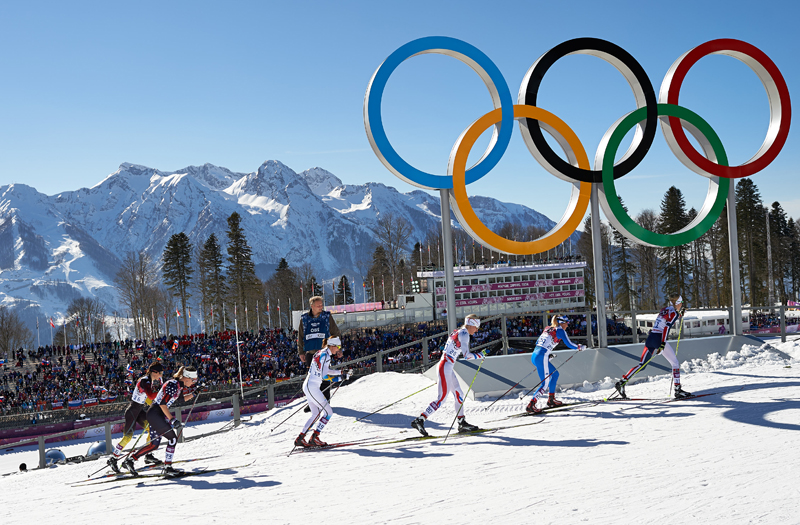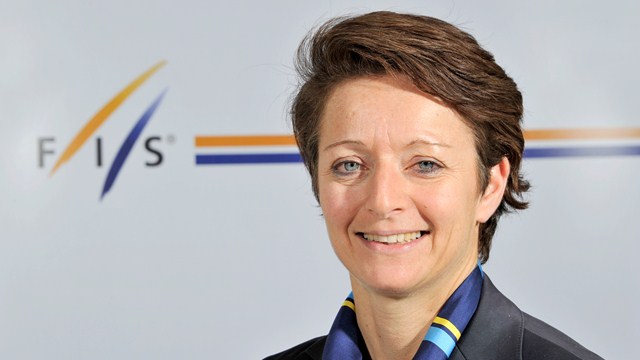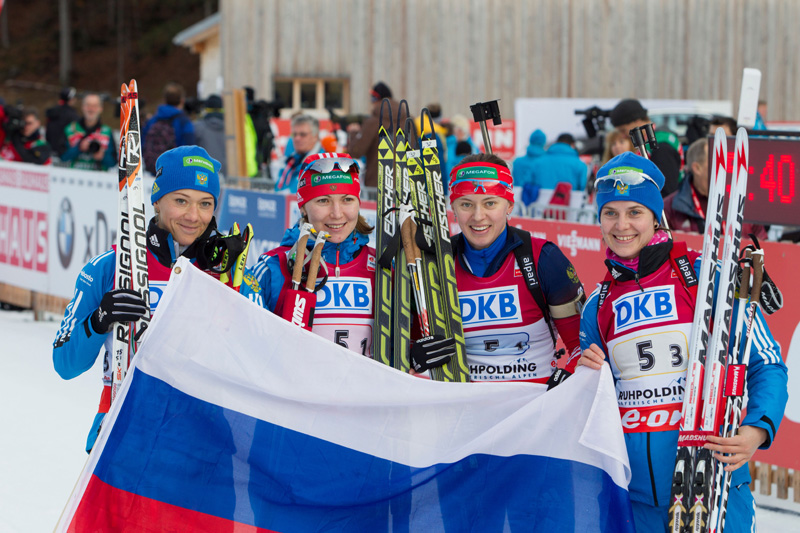
Competitors in the women’s 15 k skiathlon crest a hill at the 2014 Winter Olympics in Sochi, Russia. (Photograph: Fischer/NordicFocus)
“There requirements to be an investigation by WADA,” International Ski Federation (FIS) Secretary Basic Sarah Lewis advised FasterSkier in a mobile phone interview on Monday. “FIS absolutely supports it and we have presently expressed that anything at all we can give, we will do. And it needs to be carried out [speedily], but cautiously.”
With allegations published last week in The New York Times of state-sponsored doping at the 2014 Olympics in Sochi, Russia, attention turned instantly to the World Anti-Doping Company (WADA) and the Worldwide Olympic Committee (IOC).
FIS runs its own anti-doping program, as does every nation which sends skiers to the Globe Cup. These packages add up to 1000’s of urine tests done on skiers each and every 12 months. When it comes to the Olympics, even so, the IOC will take in excess of all in-competition testing and WADA gives Independent Observers to watch the procedure.
There had been allegations as early as November of final year, in the WADA Independent Commission report, that Russian state security personnel had infiltrated the Sochi anti-doping laboratory WADA did not stick to up on the discovering.
Hence when Grigoriy Rodchenko, the former head of Russia’s anti-doping laboratory, explained that 66 Russian athletes had been protected from testing positive by laboratory and protection workers who swapped out their dirty urine samples, there was outrage from a lot of sides.
Outrage – and bewilderment. Lewis was the head of the WADA Independent Observers at the 2008 Summer Olympics in Beijing, China. She is intimately acquainted with the anti-doping procedure and the tamper-proof bottles which have been allegedly opened in a secret lab and filled with replacement urine.

Sarah Lewis, secretary common of the International Ski Federation. (FIS file photograph)
“Frankly, these bottles, having witnessed the complete issue in action, to picture that they can be reopened– wow,” Lewis explained. “The fact that they could even be taken out of the lab is truly fairly shocking.”
WADA has pledged, last but not least, to investigate winter sports and the Sochi Olympics. But should the investigations confirm the allegations, all the IOC can do is ban an athlete from the Olympics, including retroactively. With 14 Russian cross-country skiers implicated in The New York Times report, like superstar Alexander Legkov, numerous are pondering whether World Cup final results will also be shaken up.
For instance Legkov – who won the 50 k skate in Sochi as well as helping the Russians consider property silver in the men’s relay – was on the podium 3 more occasions later that season, such as at Globe Cup finals he then earned a number of prime-10 Planet Cup final results in the subsequent two seasons. Are people benefits in jeopardy?
In the 2014/2015 season, Russian Olympians Evgeniy Belov and Maxim Vylegzhanin – who have not been implicated by name but were members of the 20-athlete staff of which 14 were supposedly on the doping checklist – each finished in the leading 10 of the total Globe Cup standings. Are the numerous personal race results that went into these standings also in jeopardy?
Whether to negate results going forward from the date of a optimistic check – if such a check exists – would be a choice left to FIS, which is also shaking its head about how doping could have took place in its sport, on the world’s biggest athletic stage.
“The story has to be verified – that is a standard principle,” Lewis said of the allegations. “If any components of it are correct, then it’s a enormous throwback, a enormous stage back for all anti-doping efforts. Particularly that this could take place at the Olympic Video games in which there are so several assets in terms of funds, personnel, worldwide skills – it’s such a key blow.”
Why Weren’t Cheaters Caught?
Russia led the planet in anti-doping rule violations in 2014: 148 athletes faced sanctions, 14 of which had been in Winter Olympic sports activities and a lot more particularly 4 in biathlon and seven in skiing. In spite of people numbers, no star cross-country skiers were caught in the leadup to the Olympics.

Irina Starykh (far correct) celebrates with her Russian teammates after they won an IBU World Cup biathlon relay in Ruhpolding, Germany, in January 2014. The outcome was voided as a result of Starykh’s doping ban, from a sample collected in December 2013. (Photograph: Fischer / Nordic Focus.)
That is in contrast to a sport like biathlon, exactly where the prime Russian woman was disqualified prior to the Video games began for testing good for recombinant erythropoietin (EPO), a blood doping drug.
So could FIS have done much more, and examined harder, in purchase to avoid the cheats from reaching the Video games in the 1st area?
“To be honest, with what they are speaking about, namely a steroid system during the Games, it is most likely that the program was really specifically targeted about the Video games,” Lewis argued. “Of course you’re usually searching at your processes, but with the out-of-competitors system we have in place it’s very comprehensive … Nevertheless in hindsight, of course you request those inquiries. Until we know what the time scale was, it is hard to know.”
A total of 6,439 anti-doping samples had been collected by numerous testing agencies from athletes across the skiing disciplines in 2013, a quantity that shrank to five,764 in 2014, the Olympic 12 months.
But right here, as well, numbers don’t tell the total story, FIS argues.
“Let us respectfully level out that this query is rather outdated,” FIS Anti-Doping Coordinator Sarah Fussek wrote in an e-mail on Tuesday. “The WADA policy and guidance to [anti-doping agencies] many years in the past was to move away from big testing numbers and move to more quality testing. For example to organise a doping handle at a remote place requires considerably far more arranging efforts, logistics, transport fees as 10 exams collected at a education camp at an easy to attain area. So comparing numbers only says practically nothing about the quality of a testing programme.”
In fact, Lewis mentioned that the Russian skiers had been targeted with a lot of exams. That reality was underscored in an interview in excess of the weekend where Legkov claimed to have been examined 33 times in the season leading up to the Games.
“Our professionals are monitoring the results of the testing from a clinical viewpoint, but also performances, participation, historical past of that nation, it’s all linked collectively,” Lewis said. “There’s no question that there is been comprehensive focusing on of the Russian team for much more than 10 many years.”
That testing did lead to a rash of optimistic exams and disqualifications just before the 2010 Olympic Video games in Vancouver, Canada. But regardless of the bans, some athletes and coaches who were picked up in the sweep stayed in the sport. In a single situation, Russian athletes who had previously served doping bans decided not to train with the national team, and alternatively took up with a coach who had been barred from operating with the nationwide team because of his involvement in doping.
Rodchenkov – the head of Russian anti-doping who admitted substantial fraud to the New York Times – also remained on the FIS Health care Committee till November, when he was suspended soon after the first WADA Independent Commission report.
The background of Russian doping in skiing is not lost on anybody. But the biggest persona on the existing scandal, Legkov, is a diverse situation from the doping Russian skiers of six or seven years in the past, at least in terms of life style. He educated not only away from the standard nationwide team coaching staff, but also largely outside of Russia, basing himself alternatively in Davos, Switzerland, with non-Russian coaches in the seasons leading up to Sochi.
Legkov has said that he is thinking about suing the anti-doping lab whistleblower for defamation.
Additionally, Lewis had self-confidence in FIS’s out-of-competition testing.
“During the winter season, you have the athletes far more or much less with you the entire time,” she explained. “It’s possible to carry out very substantial testing.”
She is obviously hoping that the sport’s greatest Russian star is not caught up in the scandal.
“We have of program dropped a note through to Alex anyway, in terms of our quick response on the scenario,” she said.
Chain of Custody

Vitaly Stepanov, a former RUSADA worker, throughout an interview with 60 Minutes’ Armen Keteyian, which aired Sunday, May possibly 8. (Photograph: CBS News)
With the accounts of malpractice in Russian anti-doping laboratories in not only The New York Times piece but also by one more whistleblower to CBS News’ 60 Minutes, there’s also a query as to whether preceding anti-doping samples belonging to Russian skiers had been manipulated.
Rodchenkov, for instance, explained that he had destroyed over a thousand samples to avert them from being re-tested by a different testing authority.
In accordance to Lewis, samples collected by FIS had been rarely stored in Russia.
“There was quite a whole lot of testing missions which were coordinated with [the Russian Anti-Doping Agency, RUSADA], but most have been carried out by the FIS-appointed doping manage agency with their personal personnel and tools,” she explained. “Most samples were transported to a different laboratory, in Lausanne or Cologne or somewhere else. We weren’t in the place that they could be manipulated in the Moscow laboratory.”
In addition, soon after RUSADA was suspended and the Moscow laboratory lost its accreditation from WADA, FIS took any samples that had been stored there quickly out of the nation.
“In truth, all the samples were delivered to Cologne,” Lewis explained. “They have been evaluated once again, all of the profiles, the blood profiles but also the steroid profile. That info was analyzed again as to whether there was the need to have to re-exams … They all returned negative.”
FIS anti-doping samples are handled mainly by a company called PWC, which is primarily based in Germany and also provides services to other international and national federations.
“PWC is currently the main sample assortment provider for FIS on the basis of an annual contract, but FIS uses regularly also the services from various nationwide anti-doping agencies, and does not have an unique contract with PWC,” Fussek explained in her e mail.
The company then delivers samples to WADA-accredited laboratories about the globe.
“The samples are not left overnight somewhere in a vault,” Lewis explained. “Doping management officers carry out the exams and then ship or take them to the lab. That time period for tampering doesn’t exist.”
Moving Forward
Information broke on Tuesday that the U.S. Department of Justice would investigate the Russian doping claims. Earlier that day, the IOC announced that it directed the Lausanne laboratory the place Sochi samples are stored to cooperate with WADA on prospective re-testing, a move that numerous have urged for months.
“The statement by WADA and the IOC in terms of re-testing samples stored in Lausanne, we completely assistance that and have championed that lead to for a prolonged time,” Lewis mentioned. “But that is an problem for the IOC, they are accountable for doping controls at the Olympics.
“In terms of what could be identified by way of the re-testing, we would also help DNA testing of the urine samples in situation there has been switching of urine and some mistakes,” she continued. “How it reads in the [Occasions] article is that they have utilised individuals athletes’ own urine, but nonetheless the experts are in a position to assess if there has been a change in terms of the composition of the samples. Plasticides have been talked about and that sort of factor.”
FIS presently worked with the Russians to ensure that testing was carried out in the 2015/2016 season, even after RUSADA and the Moscow laboratory misplaced a say in the method.
“On the request of the Russian ski association, they asked FIS to step in and arrange in-competition testing,” Lewis explained. “They did not have RUSADA to do it. We did that via the group appointed to aid them, which was United kingdom Antidoping. There was some further blood testing carried out by the FIS company throughout competitions during the season.”
That said, the testing organized by Uk Antidoping in excess of the final 6 months was not exactly a roaring good results.
Forty percent of the tests the agency was prescribed to carry out were unsuccessful, with 1 test currently being flat-out refused by an athlete. Of the exams which had been collected, 49 have been optimistic. Uk Antidoping is reportedly contemplating ending its role in Russia altogether.
Nevertheless, Lewis asserted that athletes who competed in 2015/2016 should not worry that they were dealing with an unfair enjoying field.
“Anti-Doping holds a extremely large priority in our organization,” she mentioned. “We have a robust commitment to clean sport. There is no query that we’re horrified by these stories and completely assistance this investigation to clarify that situation. But when it comes to the statements of how the manipulation was completed, in terms of exchanging samples and tampering with the bottles, those things can not come about with the testing which is carried out by the FIS-appointed company.”
For FIS, internal discussions are ongoing and the organization’s best brass has already set aside time at their biennial Congress in the second week of June.
“To be flawlessly truthful, the circumstance was and is on the agenda based mostly on the WADA report on November,” Lewis explained. “The scenario with the Russians is on the agenda of the FIS Council presently, and then clearly there is much more information to be in a position to examine and deal with.”